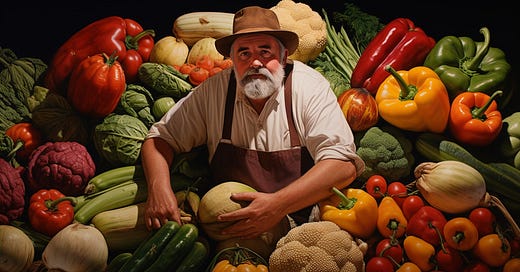The Rise of Plant Foods as Health Elixirs
In the last few decades, a narrative has formed around plant foods that’s captivated mainstream culture. You can't scroll through social media or read a health magazine without stumbling upon claims that these foods have magical properties. Eat more kale to lower your cholesterol. Drink green juice to detox. If you go plant-based, you’ll magically lose weight and achieve immaculate health. The mantra seems to be: "Plant foods will solve all your health problems."
Reality Check: Are Plants Really That Special?
Contrary to popular belief, plant foods are not bursting with a huge bounty of nutrients that our bodies are yearning for. The majority of plant foods are primarily fiber and water, with a sprinkling of vitamins and minerals—most of which are not bioavailable for humans in the way animal-based nutrients are.
The Distraction Technique: Plants Vs. Processed Foods
So, why the veneration for plant foods? Here's the simple truth: plant foods often replace far worse options on our plates. For someone whose diet is overwhelmingly comprised of processed foods—think soda, Cheetos, and Snickers—sure, an apple is an upgrade. The layperson feels better, not because of the magical properties of plants, but because they're no longer gorging on foods that actively damage their health.
Their main benefit is in what they push off your plate! This is a controversial take, but read on and see if you can agree.
The Misunderstanding in Science: Healthy User Bias
In scientific studies exploring the benefits of plant foods, there’s often a glaring oversight: the healthy user bias. People who eat more fruits and vegetables tend to also be the people who exercise more, smoke less, and engage in other healthy behaviors. When a study says, “People who eat more plants are healthier,” it doesn’t account for the fact that these people also do a plethora of other things that contribute to their well-being. The narrative gets skewed, attributing magical properties to plant foods that they simply don't possess.
Setting the Record Straight: The Undisputed Nutritional Value of Animal Foods
Here’s where we should be focusing our attention: animal foods. These are the powerhouses of nutrition, providing abundant, bioavailable forms of protein, essential fats, and micronutrients like vitamin B12, zinc, and iron. This is where you find true nutrient density that aligns with our evolutionary biology. Despite the overwhelming evidence supporting the nutritional supremacy of animal foods, mainstream health narratives still push for plant dominance. This is more than just misguided; it's a disservice to public health.
Plants: The Plan B of Human Nutrition
Let's not dismiss plants entirely; they've served a role as "fallback foods" throughout human history. During times of food scarcity, plants provided the essential calories needed for survival. And yes, we have evolved mechanisms to extract some nutrients from them. But this doesn’t make plants an optimal source of nutrition; it just makes them an acceptable Plan B. They’re our dietary safety net, not the main event.
To be clear, I'm not advocating for a zero-plant diet. Plants add flavor, texture, and some nutrients like Vitamin C and magnesium to our meals, as well as some secondary compounds that benefit our health.
For most of history plants seemed to play more of a medicinal role - and they are great for that purpose. They just weren’t meant to be the staple of our daily nutrition source. Tubers, fruit, and nuts did have an important place in our diet throughout history to give us much-needed calories. These foods are still great choices if you’re in need of calories and as a clean source of carbs.
Wrap Up
The mystique surrounding plant foods needs to be dispelled. While they’re a better alternative to processed foods and offer some variety and flavor (and can be medicinal), they aren’t the nutrient powerhouses they're often claimed to be. It's time to shift the narrative and give credit where it's genuinely due: to animal foods. These are the foods that align with our biological needs, offering a nutrient profile that is unmatched by any plant food.
The main takeaway is not that plants are useless - it’s that they are a great way to fill your plate and accompany your animal-based nutrition. They do provide a positive benefit, in contrast to processed foods (even stuff like bread) causing negative consequences.
Additionally, I don’t think it’s *required* to eat a huge plethora of plant foods to be healthy. The narrative is that we need to “eat the rainbow” to have good health. It’s fine to do so, but if it’s not working for you or you’re finding it takes too much time, consider that it’s probably not necessary :)
-Brian
p.s. If you liked this article please support our local, regenerative ranchers at Nose to Tail and consider being a paid subscriber (click below)




